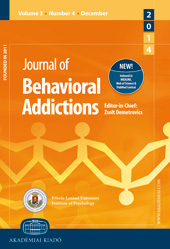Behavioral Impulsivity in Obsessive–Compulsive Disorder
Behavioral Impulsivity in Obsessive–Compulsive Disorder
Author(s): Amitai Abramovitch, Dean McKaySubject(s): Cognitive Psychology, Behaviorism, Substance abuse and addiction
Published by: Akadémiai Kiadó
Keywords: obsessive–compulsive disorder; addiction; behavioral addiction; impulsivity; decision making;
Summary/Abstract: Grassi et al. (2015) collected data to examine impulsivity in individuals with obsessive–compulsive disorder (OCD) compared to nonpsychiatric controls. Their aim was to examine whether OCD may be fully captured by the behavioral addiction model, using the prototypical mechanism underlying drug addiction as their framework. Based on their findings, Grassi et al. concluded that OCD shares behavioral components with addictions, particularly behavioral impulsivity and risky decision making. Furthermore, the authors suggested that this model may be superior to the prevailing psychological model of OCD. Findings: We argue that based on the nature of their data as well as the current dominant conceptualization of OCD in the literature, this conclusion is untenable. The authors inferred behavioral impulsivity, whereas their main finding was concerning cognitive impulsivity or difficulties in planning. Such items on the Barratt impulsiveness scale have been shown in other research to overpredict behavioral impulsive tendencies in OCD, where the nature of the condition involves doubting of action and a conservative estimate of how one’s cognitions may impact behavior. Conclusions: We conclude that similar to drug addiction, compulsive rituals in OCD may be governed by a negative reinforcement mechanism; the available data indicate that OCD does not share the two main components seen in addiction, namely, behavioral impulsivity and risky decision making.
Journal: Journal of Behavioral Addictions
- Issue Year: 5/2016
- Issue No: 3
- Page Range: 395-397
- Page Count: 3
- Language: English

